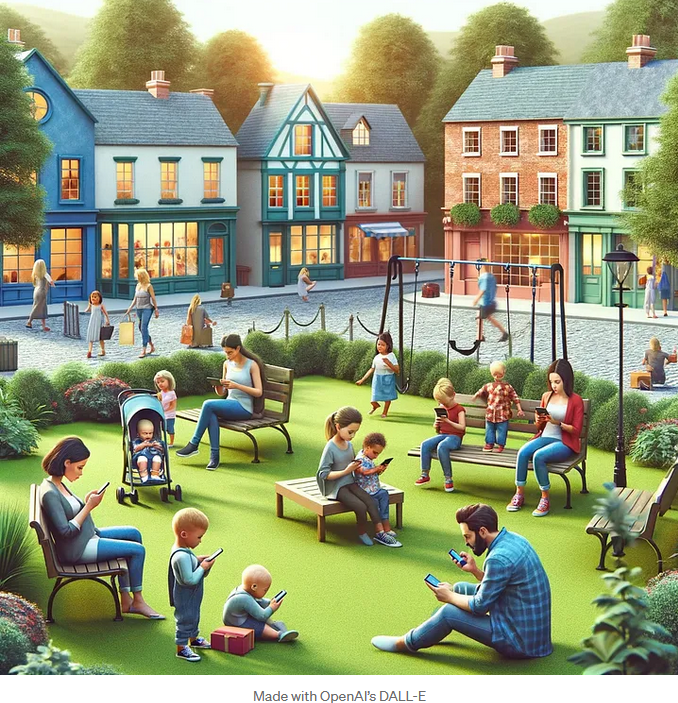Thank you to Kem-Laurin Lubin, PH.D - C for sharing her knowledge and expertise with us.
You can read this on Medium as well.
“I fear the day that technology will surpass our human interaction. The world will have a generation of idiots.” — Albert Einstein
Last year, during a family dinner, I noticed something startling: our table was surrounded by silence, not because we had nothing to say, but because everyone was engrossed in their own digital worlds, tapping away on their smartphones. It was a wake-up call about the silent takeover of technology in our most personal spaces. Yes, that includes me too. Here I was, captivated by glossy Instagram feeds that I had to see or risk missing out. And don’t forget all the DMs from a core follower group. My digital obsession was palpable and anxiety ever present.
Have you ever found yourself mindlessly scrolling through your phone, only to look up and realize hours have slipped away?
When did we start measuring our lives in likes, swipes, and endless digital notifications? And it seems to be everywhere. Recently, just walking through the park, I observed a peculiar scene: children on swings, their eyes fixed on tablets, adults on benches, lost in their phones. It struck me then, how technology, once a tool for connection, has subtly reshaped our way of experiencing the world around us.

In this blog, I will explore the journey of reclaiming our lives from the clutches of technology. It’s about finding balance in a digital age, learning to disconnect to reconnect with what truly matters.
The rise of the digital age
The digital age dawned with the development of the first computers, which transitioned from being massive, exclusive machines to personal computers in the 1970s and 80s. This evolution continued with the ground-breaking introduction of the World Wide Web in the 1990s, fundamentally altering how information was accessed and shared. The advent of mobile phones, especially their transformation into smartphones, marked another pivotal moment. These technological milestones revolutionized not just professional environments but also personal communication, paving the way for a world where digital connectivity became a cornerstone of daily life.
Today, the integration of technology into our everyday lives is epitomized by the omnipresence of smartphones and social media.
These devices and platforms have not only become ubiquitous but also essential in how we interact, gather information, and entertain ourselves.
The average person today spends a significant portion of their day engaged with digital media, often blurring the lines between work and personal life. Additionally, the emergence of the Internet of Things (IoT) has further woven technology into the fabric of our daily existence, raising both conveniences and concerns around privacy and data security. As technology continues to evolve at a rapid pace, it poses pressing questions about its future role and impact on our society and individual lives.
The impact of technology on our lives
Technology has undeniably brought numerous benefits to our lives. It has revolutionized communication, enabling us to connect with people across the globe instantly, a feat that was unimaginable just a few decades ago.
The vast expanse of information available at our fingertips has transformed education and knowledge acquisition, making learning more accessible than ever before. Moreover, the convenience brought by technology is evident in every aspect of our lives, from the simplicity of online shopping to the efficiency of digital workplace tools, greatly enhancing productivity and simplifying daily tasks. However, this digital revolution has not come without its drawbacks.
One of the most significant concerns is the diminishing attention spans attributed to constant digital stimulation. People, especially younger generations, find it increasingly challenging to focus on tasks without distraction. The rise of social media has also led to addictive behaviors, with users often caught in a cycle of seeking validation through likes and shares. Privacy has become a major concern in the digital age, as personal information is often collected and sometimes misused by tech companies.
Furthermore, the pervasive nature of technology has raised alarms about its impact on mental health, contributing to issues like anxiety, depression, and sleep disorders, as the line between digital and real life becomes increasingly blurred.
The art of disconnecting
The journey to disconnect from technology, while challenging, has been successfully navigated by many. Take, for instance, the story of Sarah, a software developer who realized her life was being overrun by screens. By implementing a ‘no phones at the dinner table’ rule and dedicating weekends to outdoor activities, she reclaimed quality time with her family. Similarly, communities like the ‘Digital Detox Retreats’ have emerged, where participants forego all digital devices to reconnect with nature and real-world interactions, often finding a renewed sense of peace and focus.
Reducing technological dependency isn’t about renouncing modern conveniences, but rather about finding a healthier balance.
Practical strategies can include setting screen time limits to avoid excessive use, especially before bedtime, to improve sleep quality. Establishing tech-free zones in the home, like the bedroom or dining area, can foster better relationships and mindfulness. Additionally, engaging in regular digital detoxes — even short ones — can significantly improve one’s mental well-being and productivity. It’s also beneficial to cultivate hobbies or activities that don’t involve screens, such as reading, outdoor sports, or artistic pursuits, to diversify how we spend our leisure time away from the digital world.
Reclaiming our autonomy
Disconnecting from the constant barrage of digital stimuli can have profound psychological benefits. Studies have shown that reducing screen time, particularly from social media, can lead to lower levels of stress and anxiety, fostering a more peaceful state of mind.
The absence of screens, especially before bedtime, contributes to better sleep quality and patterns, which is crucial for overall mental health.
Additionally, disconnecting opens up space for creativity to flourish; without the constant distraction of notifications, the mind is free to explore, imagine, and create. Importantly, stepping away from technology also strengthens personal relationships, as it encourages more meaningful, face-to-face interactions and communication, deepening our connections with others.
The benefits of disconnecting are not just theoretical but have been observed in various case studies.
For example, a study conducted at a university found that students who limited their social media use to 30 minutes a day for three weeks reported significant reductions in loneliness and depression. Another case involves a tech company that implemented ‘email-free Fridays,’ which resulted in not only a boost in employee morale but also an increase in productivity and collaboration. These examples underscore the tangible improvements in mental well-being and work-life balance that can be achieved by consciously reducing our dependence on digital devices and platforms.
As an occasional univesity lecturer, I too, have noticed a connection between grades and the students who seemed glued to their phones. But I have also noticed less and less students glued to their phones. Perhaps something worth celebrating.
Finding balance
Achieving a harmonious balance with technology involves recognizing its immense benefits while setting boundaries to prevent its overuse. It’s about using technology as a tool to enhance our lives, not dominate them. This balance can be attained through conscious choices, such as allocating specific times for checking emails and social media, thus avoiding constant interruptions throughout the day.
Incorporating ‘digital sabbaticals,’ where we unplug completely for a set period, can help reset our relationship with technology.
It’s also crucial to cultivate interests outside the digital world, ensuring that our leisure time is not solely consumed by screen-based activities. By integrating these practices, we can enjoy the advantages of technology — such as instant communication and access to information — while still preserving our mental health, productivity, and real-world relationships.
Future outlook
Looking towards the future, there’s a growing movement towards a more mindful and balanced integration of technology in our lives. It’s plausible to envision a society where digital well-being is prioritized, with more people and organizations adopting practices that promote healthy tech usage.
Educational programs might increasingly focus on digital literacy and responsibility, teaching younger generations not just how to use technology, but how to use it wisely.
In the workplace, we may see a continued shift towards policies that encourage breaks from screens and promote face-to-face interactions. Additionally, technological advancements themselves could offer solutions, like smarter notifications that filter out unnecessary distractions. Ultimately, the goal is to cultivate a society where technology serves as a facilitator of human experiences and potential, not as a detractor.
In this exploration of our complex relationship with technology, we’ve journeyed from the digital age’s inception to its profound impact on our daily lives. We’ve acknowledged the undeniable benefits technology brings, while also confronting the challenges it poses to our mental health, attention spans, and privacy. The art of disconnecting, as illustrated through personal experiences and practical strategies, has highlighted the value in stepping back from our screens.
By reclaiming our autonomy, we’ve seen the psychological and emotional advantages of a balanced digital life.
As we consider the future, it becomes clear that the key lies in finding a middle ground where technology enhances, rather than detracts from, our human experience. As you reflect on this narrative, I encourage you to assess your own technology use.
What steps can you take to foster a healthier relationship with your digital devices, ensuring they serve you, rather than control you?
In a world increasingly mediated by screens, it’s crucial to remember that the most beautiful aspects of life are often found off-screen.
And, as we navigate this ever-evolving digital landscape, let’s ask ourselves: Are we using technology to live our best lives, or are we living for technology? The answer to this question might just be the key to not only surviving but thriving in the digital age.

www.humantechfutures.ca
*About me: Hello, my name is Kem-Laurin, and I am one half of the co-founding team of Human Tech Futures. I am currently pursuing a doctoral degree at the University of Waterloo. My research inquires into identity construction through contemporary case studies (judicial) that demonstrate how citizens’ data is collected and utilized. Whether data is illicitly harvested or willingly shared, the resultant algorithmic constructions wield immense power over users whose identities are quantified through information. My research objectives are to (1) develop a critical understanding that will then allow me to (2) produce concrete heuristic principles for use in AI powered design systems (as informed by my professional experience in systems design).
Professionally I practice as a Principal HCD Strategist and Design Thinking Coach. Prior, I led both small and large Design and Research teams at Blackberry Autodesk and also worked at Siemens in both Munich, German, Princeton, USA. In my spare time, I build layered gardens with a tropical vibe while my 135 pound GSD looks on. Today I feel blessed to have traveled to over 25 countries before the world transformed to what it is today; I was able to experience a good breadth of human experiences. Periodically, I give back as an active mentor to my students, and many burgeoning critically thinking HCD Researchers who seek to make the world a better place.*